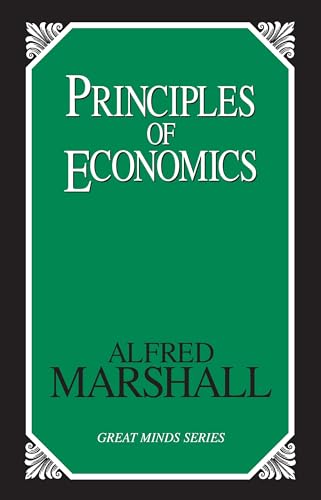
Sinopsis
British economist Alfred Marshall (1842-1924) was one of the founders of the "neoclassical" school in which economists studied both wealth and human behavior to understand why we make the choices we do. First published in 1890, Principles of Economics stands as Marshall's most influential work. This abridged edition offers a general introduction to the study of economics, dealing mainly with normal conditions of industry, employment, and wages. It begins by isolating the primary relations of supply, demand, and price in regard to a particular commodity. Following his study of science, history, and philosophy, Marshall argues that, while fragmentary statistical hypotheses are used as temporary aids to dynamic economic concepts, the central idea of economics must be that of a living force and movement, and its main concern must be with human beings who are impelled, for better or worse, to change and progress.
"Sinopsis" puede pertenecer a otra edición de este libro.
Acerca del autor
ALFRED MARSHALL, distinguished British economist, was born in London on July 26, 1842. His interest in economics arose out of his earlier studies of philosophy and mathematics. Following his tenure as first principal of University College, Bristol (18771881), Marshall taught at Cambridge University from 1885 to 1908, and lived in Cambridge for the remainder of his life.
Marshall's chief work is the Principles of Economics (1890; eighth edition 1920). One of the founders of the so-called neoclassical school, Marshall argued that the economy would run best if left on its own, and that the normal functioning of a market economy leads to full employment. Though influenced by the ideas of John Stuart Mill, Marshall substantially altered Mill's frame of reference: instead of analyzing how the production of goods and the distribution of income among different social classes affected, often dramatically, economic well-being, he studied price setting in a static context, focusing on small, gradual changes and the complex interrelations by which market balance, or "equilibrium," is achieved. And while the earlier political economists Adam Smith and David Ricardo had identified labor as the force determining the exchange value of goods, Marshall identified it as satisfaction of consumers' desires, or utility.
Marshall's orderly Victorian picture of supply, demand, and price, particularly at a time when contemporary socialists and trade unions were challenging the status quo, came under attack by later economists, including John Maynard Keynes, who demonstrated that market forces can be ineffective in promoting full employment and who advocated enlightened government intervention over laissez-faire policies. Nonetheless, Marshall's work continues to influence orthodox economics. Alfred Marshall died in Cambridge on July 13, 1924.
Marshall's other published works include Industry and Trade (1919) and Money, Credit, and Commerce (1923).
"Sobre este título" puede pertenecer a otra edición de este libro.
Resultados de la búsqueda para Principles of Economics (Great Minds)
Principles of Economics (Great Minds)
Librería: Half Price Books Inc., Dallas, TX, Estados Unidos de America
Paperback. Condición: Very Good. Connecting readers with great books since 1972! Used books may not include companion materials, and may have some shelf wear or limited writing. We ship orders daily and Customer Service is our top priority! Nº de ref. del artículo: S_438676622
Comprar usado
Cantidad disponible: 1 disponibles
Principles of Economics (Great Minds Series)
Librería: HPB-Diamond, Dallas, TX, Estados Unidos de America
Paperback. Condición: Very Good. Connecting readers with great books since 1972! Used books may not include companion materials, and may have some shelf wear or limited writing. We ship orders daily and Customer Service is our top priority! Nº de ref. del artículo: S_443825628
Comprar usado
Cantidad disponible: 1 disponibles
Principles of Economics (Great Minds)
Librería: -OnTimeBooks-, Phoenix, AZ, Estados Unidos de America
Condición: very_good. Gently read. May have name of previous ownership, or ex-library edition. Binding tight; spine straight and smooth, with no creasing; covers clean and crisp. Minimal signs of handling or shelving. 100% GUARANTEE! Shipped with delivery confirmation, if you're not satisfied with purchase please return item for full refund. Ships USPS Media Mail. Nº de ref. del artículo: OTV.1573921408.VG
Comprar usado
Cantidad disponible: 1 disponibles
Principles of Economics (Great Minds)
Librería: World of Books (was SecondSale), Montgomery, IL, Estados Unidos de America
Condición: Good. Item in good condition. Textbooks may not include supplemental items i.e. CDs, access codes etc. Nº de ref. del artículo: 00083475144
Comprar usado
Cantidad disponible: 2 disponibles
Principles of Economics
Librería: Better World Books, Mishawaka, IN, Estados Unidos de America
Condición: Very Good. Former library book; may include library markings. Used book that is in excellent condition. May show signs of wear or have minor defects. Nº de ref. del artículo: 7899712-6
Comprar usado
Cantidad disponible: 1 disponibles
Principles of Economics
Librería: Better World Books: West, Reno, NV, Estados Unidos de America
Condición: Good. Used book that is in clean, average condition without any missing pages. Nº de ref. del artículo: 5425975-6
Comprar usado
Cantidad disponible: 1 disponibles
Principles of Economics (Great Minds)
Librería: Book Alley, Pasadena, CA, Estados Unidos de America
paperback. Condición: Very Good. Very Good. Used with some reading wear but is still in great reading condition. No markings in text. Nº de ref. del artículo: mon0000752791
Comprar usado
Cantidad disponible: 1 disponibles
Principles of Economics (Great Minds)
Librería: Textbooks_Source, Columbia, MO, Estados Unidos de America
paperback. Condición: Good. Revised. Ships in a BOX from Central Missouri! May not include working access code. Will not include dust jacket. Has used sticker(s) and some writing or highlighting. UPS shipping for most packages, (Priority Mail for AK/HI/APO/PO Boxes). Nº de ref. del artículo: 000373045U
Comprar usado
Cantidad disponible: 1 disponibles
Principles of Economics Format: Paperback
Librería: INDOO, Avenel, NJ, Estados Unidos de America
Condición: As New. Unread copy in mint condition. Nº de ref. del artículo: SS9781573921404
Comprar usado
Cantidad disponible: Más de 20 disponibles
Principles of Economics Format: Paperback
Librería: INDOO, Avenel, NJ, Estados Unidos de America
Condición: New. Brand New. Nº de ref. del artículo: 9781573921404
Comprar nuevo
Cantidad disponible: Más de 20 disponibles
